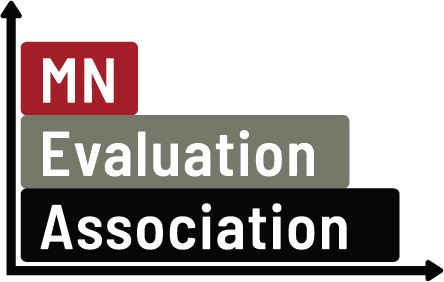Connect. Learn. Community. |
Every few months, MNEA highlights a professional member from the field of evaluation. It's a great way to make connections and reach out to other members! Here we spotlight current board members.
Summer 2022

Kassira (Kassi) Absar
The next spotlight in our series features MNEA board member and Learning and Evaluation Manager at the Bush Foundation, Kassira (Kassi) Absar.
We interview Kassi for her insights below.
----------------------------------------------------------------------------------------------------------------------------
MNEA: Kassi, thank you for agreeing to interview with us. Let’s hop right into the questions. What is your background and how does it relate to your practice as an evaluator?
Absar: I am the daughter of Bangladeshi immigrants and a cis-gender woman of color who has lived in different places in the US and abroad. With each different place I have lived in and experienced, I have learned how much there is that I don’t know. I wrote my essay to get into graduate school on that topic. The more that I lived and explored different places, it has made me realize how much there is to seek out and understand.
This perspective also helps me think about where my family came from - going back to the village where my father was born and constantly seeking out knowledge about roots, history and community. This relates to my practice as an evaluator because I think this is how we should be approaching our work - rooted in a sense of community and not with a sentiment of knowing everything. I see curiosity as one of the keys to a wealth of knowledge.
MNEA: What was your first foray into the field of evaluation?
Absar: I took a program evaluation course in graduate school. But my first experience was working with Tewa Womens’ Foundation in Nepal as their Learning and Evaluation summer intern. I did site visits, helped them build up their learning practice and shared skills that I had with them. That was my first experience with field visits focus on evaluation. It was an interesting way to experience evaluation because it allowed me to be very thoughtful about what was being shared with me and understanding context and culture. It was very rewarding.
MNEA: What would you say is the most important principle for evaluation practitioners to keep in mind?
Absar: This is more a general principle. There’s talking about racial equity versus being equitable. The term ‘equity lens’ is a bit misleading in that equity should always be inherent in our lens. I realize the need in some cases to be more explicit about centering equity in our work but want to move to a place where having a panel on racial equity isn’t enough. I want us to start thinking about partnerships, representation and being equitable in our lives and in our principles.
A couple of important principles that are specific to evaluation is recognizing that a formal degree does not make you an evaluator and that the solutions and groundwork in our field have been created in the community long before us. Yes, we have skills that we bring to the field, and we are also so limited in what we know and understand about the various contexts within which our field is applied.
What we know and understand should continue to be shaped with the people that we’re in partnership with. Evaluation should not be ‘done to’ it should be ‘done with.’ With that comes a recognition that there is a hierarchy in this field. There’s so much unearthing to do of how evaluation as a field was built. Contextual community knowledge and meaningful relationship-building are important skills for evaluators to have.
MNEA: What are your hopes for the future of the field of evaluation? (specifically from where you sit in it)
Absar: One hope is that the people who are not seen as “experts” and “leaders” in the field, who have been left out of the evaluation ‘tree’ get their deserved credit for the work that they have done. Thank you to Vidhya Shanker for doing a lot of this work and helping me understand more about that. The other change I would hope for, is taking away the contractual nature and feeling of evaluation. As a field, there is a lot of contracting that happens in evaluation which is understandable. I want there to be a more organic feeling around working together and around partnerships. I want evaluation to meaningfully be utilized and shared, and I don’t want it to always feel so complicated - even though it needs to and can be sometimes. I want it to be accessible - in all the meanings of the word.
MNEA: Lastly, for our readers, what is one evaluation or research resource that you love to geek out on?
Absar: I feel like my answer should be more profound, but I love digging into the US Census Bureau’s website. This doesn’t mean that every piece of data they have or their approach to everything is correct, or that their data disaggregation is perfect. We know there is lacking data when it comes to our Native friends and relatives.This is more of a caveat that I’m not signing off on all the things shared by the Census Bureau website, but they have a lot of interesting reports, webinars and data that they put out. I like clicking around and reading their reports. The Milwaukee Evaluation Association and Pew Research are also great resources.


